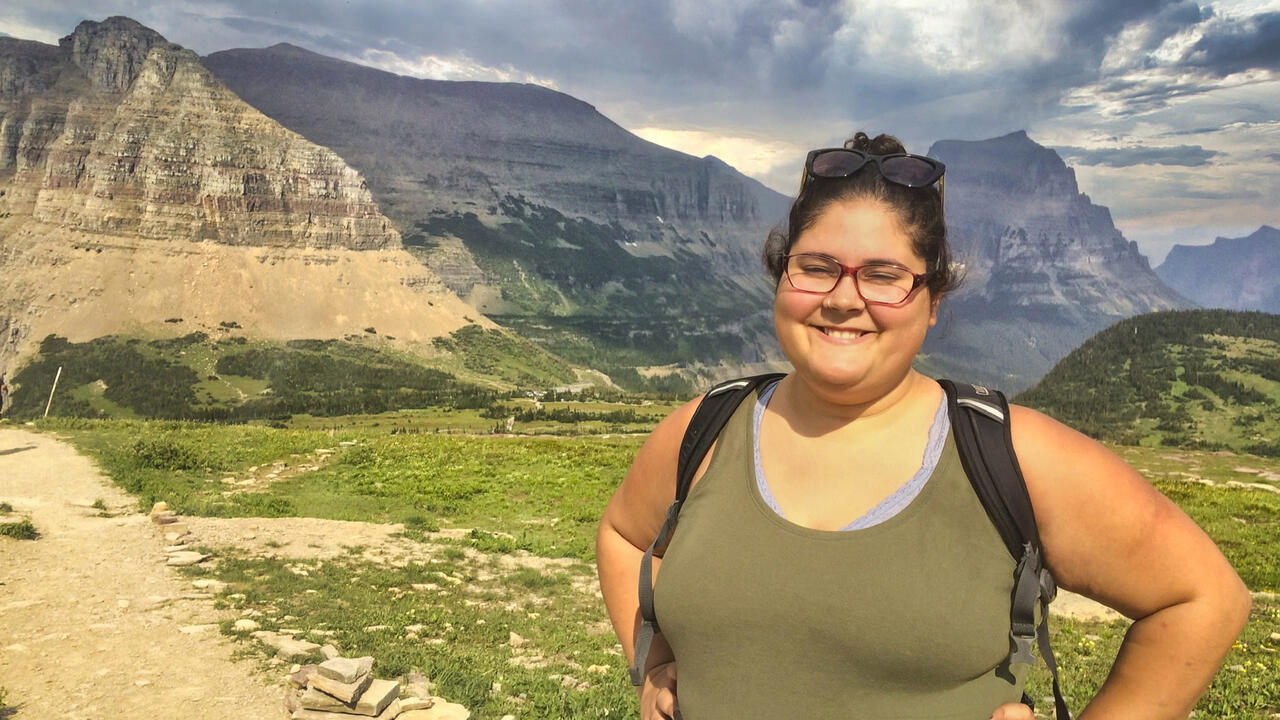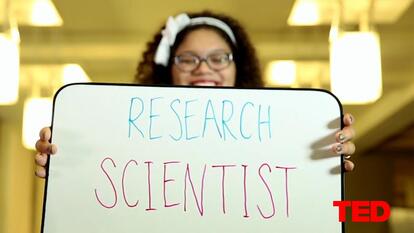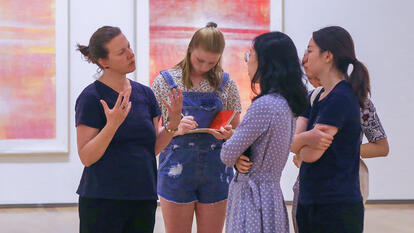
From Montana to Manhattan, Dania Figueroa ’17 Finds Empowerment in the Lab
In the fall of 2016, as the convocation of her final year at Wellesley College approached, Dania Figueroa ’17 was growing increasingly nervous about her upcoming thesis project. When she met with her mentor and advisor, Donald Elmore, professor of chemistry, to discuss her concerns, he asked her: What do you want to work on?
Figueroa wasn’t prepared for the question. “I just expected for him to tell me what my thesis was going to be,” she said, “but he helped me get to a place where I could come up with my own project, to understand, as much as I could at that stage in my development, what was missing in the field.”
What Figueroa wanted was to follow her interest in viruses, a fascination that took root when, as a high school junior in the Miami area considering a career in law and public service, she came across Richard Preston’s The Hot Zone. “I remember reading that book, and being blown away by the power viruses had, and just wanting to learn more and study more about them,” Figueroa said.
At Wellesley, Figueroa worked for all four years in Elmore’s lab, with the Sophomore Early Research Program, and through a Science Center Summer Research Award. Her work characterizing antimicrobial peptides and their modes of action on the molecular level gave her the foundation she would need for a future in research. Elmore also encouraged her to speak out about the challenges she had faced as a first-generation Latinx student navigating academia, and to pursue her interest in mentoring students, both in his lab and through a program Wellesley runs with Framingham high school. That set the stage for what would become a throughline for Figueroa at Wellesley and beyond: finding empowerment, and seeking to give others opportunities, through science and research.
“Research was what I considered to be my saving grace ... The process really values creative thinking and perseverance.”
Dania Figueroa ’17
Getting Her Start
When she was applying to colleges, Figueroa was at first unsure whether she wanted to pursue a career in government or science. She chose Wellesley in part because it would offer her opportunities to dive into both. “My understanding was this idea that you could do humanities and you could do STEM,” she said. When she visited Wellesley during Discover Wellesley Weekend, she said, “I absolutely fell in love with this idea of being in this space where women were encouraged to pursue their interests.”
As a student at Wellesley, she also fell in love with research. “The non-monotony of it, the creativity, how I can interact with people and also be independent if I choose to be,” Figueroa said. “Having intellectual conversations about new information, and trying to figure out new pathways. All of that.”
It took some time for her to learn to ask for help, discover the resources that were available to her on campus, and to ask for extensions when needed. She was also often juggling multiple jobs on campus at the Science Center and in the dining halls, office hours with principal investigators and professors, and tutoring sessions.
“Research was what I considered to be my saving grace,” she said. “Research was one thing that I felt it didn’t matter what advantages you’d been given. The process really values creative thinking and perseverance. Going through Wellesley, those are things I definitely gained and now have to my advantage.”
Leaving Her Mark
During her senior year, Figueroa applied for a postbaccalaureate program through the Intramural NIAID Research Opportunity with the National Institutes of Health at the urging of Megan Núñez, professor of chemistry and dean of faculty affairs. Figueroa was accepted, and joined a group of 20 students from around the United States for a three-day conference at NIH headquarters, where grantees were paired with principal investigators.
At NIH, she met virologist Vincent Munster, and eventually joined his lab in Hamilton, Mont., a town of 5,000 nestled in the Bitterroot Mountains, worlds away from Miami and Boston. Munster researches the evolutionary dynamics of emerging viruses, modeling zoonotic and cross-species transmission of viruses, and the efficacy of outbreak intervention strategies.

Figueroa spent two years in Montana developing a reverse genetic system for coronaviruses, for which she received biosafety level 3 (BSL-3) training, and developing a field-accessible qRT-PCR assay that allows researchers to detect Ebola virus in wildlife carcasses, particularly lowland gorillas. She later adapted the assay for Sin Nombre virus, and was able to test it during a collaborative fieldwork project.
Figueroa left a mark in Montana beyond her fieldwork. While in Hamilton, she received an NIH Merit Award for her collaborative efforts in establishing the first diversity and inclusivity subcommittee at Rocky Mountain Laboratories, the NIH complex that housed Munster’s lab.
“One of the comments that I heard a lot while I was out there was that people from marginalized communities didn’t want to move to Hamilton because it was so isolated and homogenous,” Figueroa said. “I fought against that because I didn’t think it was true. I wanted to ask, ‘What are we doing or not doing that is causing this impression?’ That was something I wanted people to think about a little more deeply: What could we do to increase recruitment of marginalized communities to Rocky Mountain Labs?”
Figueroa joined with other scientists in Rocky Mountain Labs to organize a seminar series inviting researchers of diverse backgrounds to visit the labs and give talks about their experiences within the scientific community and invited members of the scientific community to discuss how they include marginalized communities in their research.
Looking Ahead
Currently, Figueroa is once more in the process of choosing a lab to join, this time as a doctoral student in the biomedical sciences program at the Icahn School of Medicine at Mount Sinai in New York, where she hopes to focus on virus-host interactions and how viruses are able to overcome adaptive and innate immunity. “All the labs I’m interested in here work on these types of questions in their own little niche. I have to think about what questions I want to ask and also what the right lab environment is for me,” Figueroa said.
She is also on the student affairs committee at Mount Sinai, working to build community for underrepresented populations within the PhD program, and she’s the director for diversity and inclusivity for the New York City chapter of March for Science. Figueroa now understands the importance of a lab environment that nurtures students of color and women not only as scientists, but also as leaders. “I really valued the great lab environments I’ve been in at Wellesley and at NIH, and the connections and progress I’ve made, and the research I’ve done,” she said. “That’s really been facilitated because I felt comfortable in those spaces.”
It isn’t just the lab work that drives Figueroa, it’s also expanding the space within that culture to include others. “One of my big pet peeves is when people say, ‘You know, things are so much better than they used to be,’ or ‘bide your time,’ or ‘wait until you’re in a position of power to change things,’” Figueroa said. “I think it’s important to appreciate and understand that things are changing, but that it’s equally important to ask for more, and demand better. Because otherwise, I don’t think things will change as we expect them to.”



